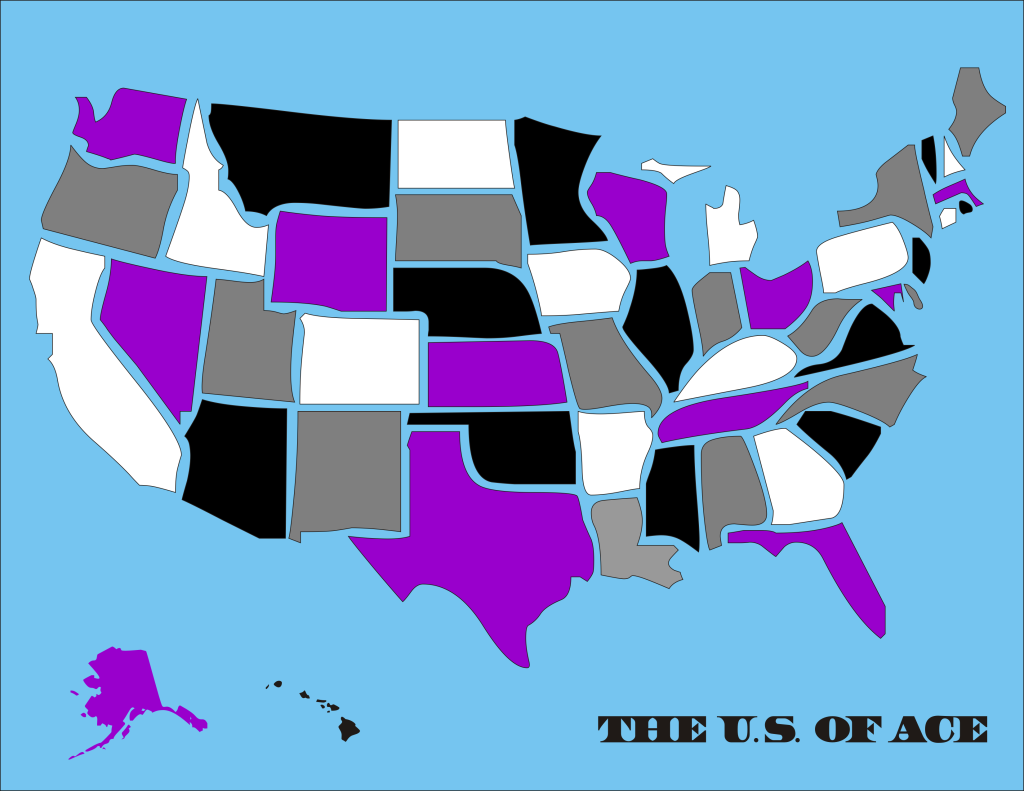Asexuality is an amazing topic. People who have never heard of it instantly become experts and will start spreading their infinite wisdom on the subject. Never mind that they refuse to listen to what actual asexuals have to say. They don’t have to listen to us! They know more about who we are than we do!
They know the true definition of asexuality, even though we, the people who define asexuality, do not.
They know the exact criteria for being asexual, even though their criteria may be absurd at times.
They know about all the things going on in our minds, even the things we don’t remember or that never actually happened to us.
Their information, based on conjecture and assumptions, is accurate and infallible, while our information, based on reality and our own lives and experiences, can be dismissed outright.
Specific Subclasses:
I Wrote The Dictionary! [#]
Examples:
- If you’re asexual, it doesn’t mean you don’t experience sexual attraction. If you’re asexual, it means you have sex with yourself. It’s in science. Something about bacteria.
- What you describe is aromantic autosexuality rather than asexuality.
- Isn’t demisexual just another way of saying “this is what a healthy, sexually intimate relationship should be like”?
- Pure asexuality means no sexual contact at all—-any sexual contact defeats the meaning of asexuality.
- Secondly, the etymology of the word asexual has always referred to a species that does not require sex for reproduction. Putting all this together, what i see here is a poorly chosen way to describe a persons lack of sexual desires.
- That’s ridiculous. Another word for it is a eunich who have been around since biblical times.
- Why is “unattracted” NOT a more accurate word for the situation being discussed than “asexual”?
- This guy probably doesn’t know that from the 19th century up until the 1960’s the word “asexual” was a cover for people not wanting to acknowledge that Tchaikovsky, for example, was homosexual.
- Asexual, as I have come to know the term refers to someone who enjoys having sex with any gender but has not emotional attachment to them.
- Here is my big problem with using the word asexual inclusively to encompass many who are not actually non-sexual.
- Asexual sounds more like Anhedonia
- Most of them aren’t actually asexual, but instead autosexual.
Why these comments are a problem:
People who make comments like these are convinced that asexuality is all wrong because it doesn’t match the definition in their dictionary. Often, it’s an imaginary dictionary that exists only in their minds, but they will occasionally go to a physical dictionary to “prove” their point.
In the imaginary dictionary case, they try to invalidate asexuality by offering another word that they feel describes things better than “asexual”. You’ll see words like “non-sexual”, “autosexual”, or “solo-sexual” thrown around frequently, with the occasional “analloerotic” or “anhedonia” thrown in for good measure. Sometimes, they’ll add additional restrictions and qualifications to the meaning of asexual. “Asexual means no arousal, too.” “Asexual means no masturbation, too.”
In the physical dictionary case, they try to invalidate asexuality by showing that our definition isn’t present. “Look, it’s all about bacteria!” “Look, it means no sex organs!” They’ll claim that the word is already taken and that we have to find a new word to use, because apparently words can only have one meaning. (Like “gay” and “straight”, which have only had one meaning ever.) They don’t understand that language adapts and evolves and grows all the time, and that it’s just a snapshot of common understanding at a point in time, and not a rulebook for the only words that can ever be used.
In either case, the true problem is that they refuse to listen to what asexual people are telling them asexuality is. Their outsider “expertise” is far more important than our actual experience.
(Plus, my dictionary, an actual physical ten pound block of processed wood pulp from 1999, has a definition for “asexual” that mentions sexual desire. Not quite the current definition, but close enough for horseshoes.)
How to respond:
- Explain what the commonly accepted definition of asexuality is and is not.
- Point out that dictionaries describe language and will change as the language does. If you know of a dictionary that mentions the sexual orientation definition of asexuality, mention it.
- “Does your dictionary have ‘homonym’ or ‘polysemous’?”
- Give examples of common words with multiple meanings.
You CAN’T Be Asexual If You’ve Ever… [#]
Examples:
- An asexual who has sex is not asexual. FYI.
- If you are cleaning the pipes then you are not asexual.
- Masturbation is absolutely sexual. A virgin has a sexual orientation, don’t they? Human beings aren’t asexual, single-celled organisms are.
- If you have had a crush, and have blushed…. The sexual emotion and desire is within you…. You are not asexual.
- if you can experience sexual arousal then you are also experiencing sexual ATTRACTION.
- The point I am trying to get across, though, is that many masturbators have vivid sexual fantasies that fuel their activities and it not really appropriate to call such folk ‘asexual’.
Why these comments are a problem:
People who are not asexual do not get to define the qualifications for what being asexual means. Comments like this serve to invalidate us through misrepresentation. They act like they’ve caught us in a lie, that we’re just pretending to be asexual, even though we’ve done something that clearly means we can’t be (by their limited definition). These comments generally involve confusion (often intentional confusion) about the difference between sexual activity and sexual orientation. In many cases, people making these comments mistakenly believe that asexual means “completely devoid of sexual functioning”, and think that the presence of any kind of sexual response means that someone cannot be asexual. “That’s SEXUAL, so you can’t be ASEXUAL!” is a common refrain. It’s also total hogwash.
It’s frankly baffling how anyone can claim that arousal is proof that someone isn’t asexual. For many people, asexual or not, genital arousal just happens sometimes, like in the case of “morning wood”. Sometimes it’s an unintentional response to physical stimulation, like getting wet from wearing tight clothes or driving on a bumpy road. And even when it is intentional, arousal isn’t necessarily a sign of sexual attraction. The right kind of physical stimulation can be all that it takes. Arousal is a physical response that requires no mental involvement. Now, certainly, for many people, arousal is the result of “thinking sexy thoughts”, but that’s not the only way to get there.
“Thinking sexy thoughts” or fantasizing is also not proof that someone is not asexual. It’s possible to have sexual thoughts about a fetish that doesn’t involve people. It’s possible to have sexual thoughts about an activity that doesn’t involve people. Many asexuals who fantasize describe largely anonymous situations, where there are nameless someones just playing a role. Sometimes, the fantasies are about other people having sex, and the fantasizer is just an observer. None of those cases require sexual attraction. Even in the case where someone has a fantasy that involves someone they know, it may not involve sexual attraction.
I find it strange when someone claims that masturbating means someone isn’t asexual. If I’m not asexual because I masturbate, then what am I? I’m not attracted to women. I’m not attracted to men. So I’m not straight, I’m not gay, and I’m not bisexual or anything else. What am I, then? How is a few minutes of touching with the intent to invoke a physical response supposed to mean that I’m straight or gay or whatever? Some people will claim that masturbation requires fantasy and fantasy requires attraction (already debunked, see above), and that nothing will happen otherwise. This is absolutely not the case. While utilizing sexual attraction is helpful for some people, it is not required in order to masturbate or to experience orgasm. Many people, including many non-asexuals, discover that touching themselves in a certain way feels good, long before they have any clue what sex is.
Even having sex itself does not require sexual attraction. There are many reasons people can have sex other than attraction. They want to know what it’s like, they’re doing it for their partner, they’re doing it because it feels good for them, or they want to conceive are just a few. No one would claim that a prostitute was attracted to all of their clients. No one would claim that a closeted gay man who had children with his wife would have to have been secretly straight in order for that to happen. So why is it so hard to believe that an asexual can have sex without attraction?
How to respond:
- Give straightforward counter examples that refute what they’re saying. If they claim that arousal requires attraction, ask them about “morning wood”. If they claim that sex requires attraction, ask them about gay men who are fathers.
- Correct their limited definition of the word asexual.
Asexuality is a barrier or defense mechanism! [#]
Examples:
- Maybe even a coping or defense mechanism to deal with erotophobia.
- I’m not buying asexuality. I feel it’s a mental illness of some kind or at the very least like some sort of defense mechanism to justify or rationalize not growing up, not getting sex, being bad at sex, or after having a really bad experience with sex or relationships.
- poor things frigid and what a life in a personal prison must be triggered by deep fear
- I’m skeptical such an orientation exists. I think it’s a lot more likely that there are other things that are stopping a person from wanting to have sex than not having any drive at all. Fears, hang-ups, consequences, etc.
Why these comments are a problem:
Armchair psychology is pretty much never a good idea. What these people are saying is that asexuality is purely a mental block, that all we have to do is overcome our fears or disable the defense mechanism, and presto, we’ll join the ranks of the sexful masses, like normal people! It’s saying that we’re broken, that we just need to go and get ourselves fixed.
While it’s true that some asexuals are, in fact, afraid of sex, not all aces are. On top of that, plenty of non-asexual people are afraid of sex. A fear of sex just makes you a person that’s afraid of sex, it doesn’t make you asexual.
They never even bother to ask if we’re afraid of sex, they just throw it out there as unquestionable fact. And if you try to deny that you’re afraid of sex, well then, you’re so far repressed that you’re not even conscious of the fear! Ten more years of the therapy couch for you!
How to respond:
- Explain that asexuality is a lack of sexual attraction, not a fear of sex.
- If you are asexual and are afraid of sex, explain how the concepts are different.
- If you are asexual and are not afraid of sex, explain how you’re not afraid of sex.
- Out armchair psychologist them and give them references to papers and reports by REAL psychologists and therapists and researchers who accept asexuality as a real orientation unrelated to mental barriers or emotional defense mechanisms.
It’s not an orientation. It’s a lack of one! [#]
Examples:
- What’s silly and pointless is trying to assert that a lack of orientation is an orientation.
- If you are not attracted to any gender, you have no orientation.
- That’s like saying bald is a hair style.
- It’s like saying that atheism is a system of belief.
Why these comments are a problem:
I have two main reactions to these kinds of comments.
First, asexuality is a real sexual orientation. Actual, real, scientist people, who do actual real sciency things for their job all day support this. So, it doesn’t really matter what some random nobody on the Internet thinks.
Second, their objections are fairly illogical. They seek to invalidate asexuality for whatever reason, so they try to claim that it’s not a sexual orientation. They never say “I believe in asexuality as a concept, but don’t call it an orientation.” No, they dismiss the entire idea of asexuality as a fraud. So, how exactly is their logic supposed to work here? “I don’t like that you’re claiming that asexuality is a sexual orientation, so I’m going to deny that it is one and pretend that makes you disappear.” I don’t think that’s quite how reality works.
Sexual orientation is the description of the gender or genders that someone finds sexually attractive. Think of it as a series of check boxes: Male, Female, etc. Your gender, combined with the gender check boxes that you tick off, describe what your sexual orientation is. If you check off the “Male” gender box for yourself, and then check off the “Male” and “Female” boxes for the “Attracted to” column, your sexual orientation would be described as “Bisexual”. Now, if you don’t tick any of the boxes in the “attracted to” column, that doesn’t somehow make the boxes disappear. They’re still there, and it is important and useful data that you did not check off any of them. That important and useful data of having not checked any boxes means that your sexual orientation would be described as “Asexual”.
How to respond:
- Show the person actual sciency stuff that calls asexuality an orientation.
- One phrase that I’ve seen a number of times is “Asexuality is the ‘orientation of no’, not ‘no orientation’.”
- Another explanation is that sexual orientation is the answer to the question “Who are you attracted to?”, and that “No one” is a valid answer to that question.
They just haven’t figured out what they like yet. [#]
Examples:
- I do not believe there are asexuals.They just haven’t really “found” themselves yet sexually
- Don’t believe it. I think there needs to be something either psychologically wrong with the individual or they haven’t come to terms with their sexuality.
Why these comments are a problem:
These comments are a problem because they completely ignore what we’re saying.
Us: “I’m not into men. I’m not into women. I’m asexual.”
Them: “You’ll figure it out someday.”
Us: “I have figured it out. None of the above.”
Them: “You’ll decide eventually. No rush.”
How long are we supposed to keep trying to figure it out before we’re allowed to say that we actually have figured it out? When will they be satisfied? 20? 30? 40? When? Wait too long, and it’ll shift from “You haven’t figured it out yet, keep trying” to “Well, you’re up in years and so it’s only natural that you’re not interested anymore.”
By the time someone is willing to say “I’m asexual”, they’ve already done a lot of personal exploration. There have been many hours spent wondering why they’re different from everyone else. There have been many hours spent saying “Am I sure?”. There have often even been many hours spent testing themselves. After all that, it’s safe to say that they’ve “Figured it out”.
How to respond:
- Explain that you have “found” yourself sexually or that you know what you like or whatever. Explain that you are asexual and know that you are asexual the same way that they know they’re straight or gay or whatever.






